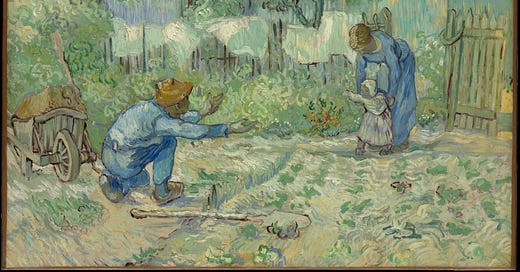What Do You Wish For Your Children?
How much can parenting result in the virtues, traits, and outcomes we want for our kids?
You’re reading From the Desk, a monthly newsletter from Miles Farnsworth about the arts, spirituality, and living the good life. Scroll to the bottom to see Recs from the Desk and 5 Photos from the Last Month.
Consider subscribing to read From the Desk in your inbox.
What do you wish most for your children? Good health? Kindness? Intelligence? Most parents could answer without thinking too hard.
The occasions when I’ve pondered this question most have been at the blessings of my children. In the Latter-day Saints faith, we bless each baby within the first few months of life. Holding the infant in a circle with other men, the father says a prayer invoking God’s favor on the child before addressing the baby directly to pronounce additional blessings.
Since the blessings are not recorded and as the baby can’t understand a word of it, the specifics are soon lost to time and memory. Even though I’ve performed two of these blessings myself in the last four years, I can barely remember what I said.
But if I sat down today and put pen to paper to write down the attributes, outcomes, and traits I’d desire for my children, what would I say? What would you?
Literature is full of examples of parents’ wishes, some long and eloquent, like Polonius's speech to his son Laertes in Hamlet. Others are short, a single line or two, as in this example that first comes to my mind from The Great Gatsby when Daisy Buchanan says of her daughter in the opening chapter, “I hope she’ll be a fool—that’s the best thing a girl can be in this world, a beautiful little fool.”
Of course, Daisy herself wishes she were the fool, blind to the infidelity of her husband, Tom. Such is the case with many parental desires. We hope our children won’t make the same mistakes or struggle with the same setbacks that have plagued us. I recently read an earnest blog post from a father who hoped his son would be popular, a desire that stemmed from the father’s own frustrated teenage years.
Aside from rectifying our shortcomings, there are some universal values we want our children to possess, as examined in this 2014 Pew Research survey. In the survey, Pew chose twelve values they thought were universal and asked parents to rank which were most important. “Being Responsible”, “Hard Work”, and “Helping Others” were the top three.1
The Pew results are a little dull (unless you read the footnote). Here’s a low-stakes exercise that proves that could be more revealing. It’s probably one you’ve already done with a spouse. Choose between these attributes in your children (or hypothetical children, if you don’t have any): Kind or intelligent? Confident or humble? Content or ambitious? Disciplined or creative? Light hearted or diligent? Loyal or independent? Ranking virtues is a fun exercise to do with a spouse. While not opposites, the forced comparison unearths which values you favor most.
If you know the kind of person you want your kids to become, what can you do to raise children to reach these expectations? How much of who our kids become is cultivated by careful teaching and example, and how much of it is innate in the child the moment they burst into the world?
Experts could answer this better, but any parent sees both intrinsic qualities in their child and the imprint of family culture. The question is: to what degree?
If your parents are happily married, are you likelier to have a happy marriage? Does growing up in a financially conservative home always translate to better money management in the children? If your dad drags you to service projects for widows in the neighborhood, as my father did, is it inevitable that you feel inclined to serve?
Here’s a question to consider: What traits did your parents aspire to ingrain in you? How well did they succeed? Could you pinpoint your family values or the specific outcomes you imagine your parents were aiming for in your life?
When I look at my brothers and sisters, all of us have our own unique interests and talents, though we approach life in similar ways. My parents valued and sought for their children to work hard, grow their religious convictions, love their spouses, and live a balanced life. Most of us retain a certain frugality, but whether that was the result of specific teaching or a natural outcome of the circumstances of our family finances when we were young, it’s hard to say.
Every parent fears becoming too overbearing, that an insistence on certain values may have the opposite effect, turning the child away from the path the parents tried to push. A child who falls short of high academic expectations may struggle with self-worth. A kid forced to church might determine never to go back. And even without being overbearing, on some matters, a child could choose a different route merely to see what differences they’ll find.
When it comes to those innate parts of a child’s disposition, the literal DNA inside them that expresses itself in personality, physical features, and natural abilities, it seems the best a parent can do is foster positive natural outcomes. Athletics, attractiveness, and artistic ability probably stem from biology more than tutelage, but teaching a child to work hard, to practice, or to take care of their gifts are teachable skills.
Finally, as parents, we wish for outcomes that will not occur until years into the future and over which we have little control. I initially scoffed at the father who wanted a popular child, feeling that he was wasting his hopes on something he could not accuate. Yet, don’t we all have aspirations for our children, be they stability, wealth, commitment to a specific religion, a happy marriage, or a fulfilling career? We do our best to model those outcomes and guide our children both to see these as desirable outcomes and equip them with the skills we think they’ll need to achieve them. But our kids’ lives are not ours to live, nor their choices ours to make. It can’t hurt to hope, right?
In conclusion, as I’ve written and edited this post, I’ve had a lot of time to think about my own kids and what I want for them.
Here are my desires for my children, in no particular order:
Always be respectful of others, no matter their life circumstances.
Find and stay committed to the things that bring them joy and stimulate their creativity and intellect, even when it takes significant effort.
Find someone they love to build a family with.
Always desire to maintain a relationship with me and their mother.
Develop their own relationship with God and stay true to their faith.
Learn the value of working hard in all facets of life.
Always have enough to provide for their needs and health.
Something lighthearted: A 3D designer illustrates bicycles based on people’s attempts to draw them from memory. Why are bikes so hard to draw?
Something to eat: Dark Chocolate Oreos. Yes, you read that correctly. I know I usually plug something cultural, but these were too delicious not to share. Bought them on a whim to go with some homemade ice cream a neighbor brought over.
Something to listen to: Mickelle and I attended an “Evening of the Arts” here in Spokane (Mickelle exhibited), and a pianist performed a piece called Souvenir de Porto Rico by Louis Moreau Gottschalk. Worth a listen, and this version on YouTube shows the sheet music so you get an idea of how insane it is.
Something for Easter: Mickelle painted scenes from Holy Week in her signature tiny mode (drop goes live at 10am PT).

Also interesting was the segmenting based on political affiliation, gender, and race. For example, liberals value tolerance more than conservatives, while conservatives value obedience more than liberals. Parents wish for empathy more for their daughters than their sons, and for their sons to be more hard working than their daughters.











Having just had my first baby, this is a question I’ve been asking other parents for months! Many said they’d never considered it before and it has been so rewarding to talk it through. My answer is I wish Thalia the ability for critical thought, but I’m a strong believer that if you think hard enough about anything, it will lead you to be kind, caring, loyal, etc. Not everyone agrees 😁
Great work capturing the feelings of parents! I've been contemplating similar thoughts recently after the birth of our second child.
Gottschalk's "Le Banjo" was introduced to me by my grandfather when I was young and remains a favorite. Gottschalk is a talented and perhaps underrated composer.